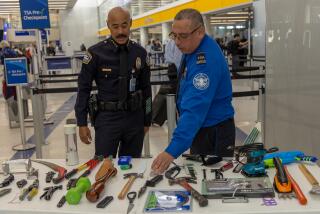On Eve of a New Cease-Fire, Battles Break Out in Bosnia
SARAJEVO, Bosnia-Herzegovina — Battles raged throughout the republic Sunday, just hours before a truce between Serbian and Croatian forces was supposed to begin.
The cease-fire, one of many declared in this embattled nation, would not include Bosnia’s Muslim-led government.
Hours before the cease-fire was to take effect, Nobel Peace Prize winner Elie Wiesel appealed for a summit of world leaders to try to halt the carnage in Bosnia-Herzegovina.
Wiesel, a survivor of two Nazi concentration camps, was invited to the Balkan war zone by the Serb-led Yugoslav government.
Wiesel spent about five hours in the devastated Bosnian capital and met separately with leaders of the government and rebel Serbs who have besieged the city for months. He also visited a prison for Serbs captured during the bitter fighting and met with writers and Jewish leaders.
“I think the siege is a scandal. . . . I fear the worst is still to come,” he said after viewing the wreckage of the city, where 380,000 people now fight a daily battle against hunger and cold.
“The situation should be dealt with on a summit level, because it’s endangering world peace,” he said.
Wiesel’s visit coincided with the scheduled start of a U.N.-mediated truce between the Croatian army and Bosnian Serbs. The cease-fire was confirmed by the Serbs and U.N. officials in Sarajevo, but Croatian statements have been equivocal.
A Croatian general told television in Zagreb, the Croatian capital, that the Serbs have not signed the agreement, which he said was limited to a few areas where Croats and Serbs are in direct conflict.
The Belgrade news agency Tanjug reported that Croatian and Muslim forces, backed by a strong artillery barrage, launched an all-out infantry attack on Bosnian Serb positions in the Mostar-Nevesinje region of Herzegovina.
Sarajevo Radio claimed that Muslim forces threw off a Serbian bid Saturday night to seize a former Yugoslav army barracks east of the surrounded northwestern city of Bihac, killing 25 Serbian fighters.
More to Read
Sign up for Essential California
The most important California stories and recommendations in your inbox every morning.
You may occasionally receive promotional content from the Los Angeles Times.








